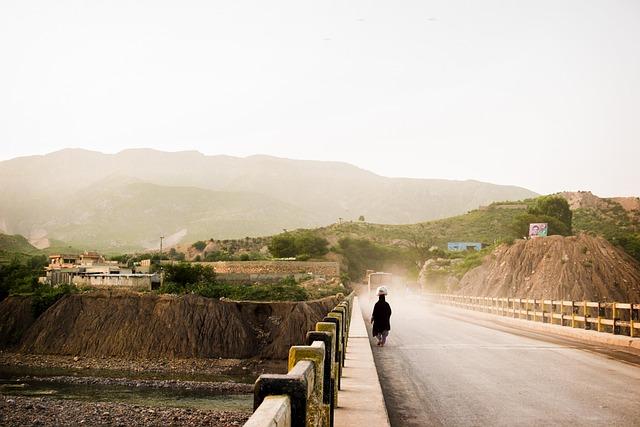Navigating Truth: The Future of Journalism in Pakistan
In a rapidly evolving landscape, where the boundaries between fact and fiction blur with each swipe of a smartphone, journalism in Pakistan stands at a pivotal crossroads. As the heartbeat of democracy and a custodian of truth, the profession grapples with myriad challenges—from the rise of misinformation and the pressures of censorship to the relentless demands of a 24-hour news cycle. This article embarks on a journey through the intricate tapestry of Pakistani journalism, exploring its historical roots, contemporary hurdles, and the innovative pathways that may shape its future. With the convergence of traditional practices and digital advancements, the quest for truth becomes not just a vocation, but a vital mission—one that seeks to inform, challenge, and inspire an ever-changing society. Join us as we navigate the currents of change, examining how journalists can uphold their commitment to truth in a nation where every story counts.
Challenges Facing Journalists in Pakistan Today
The landscape of journalism in Pakistan today is fraught with hurdles that undermine the pursuit of truth and integrity. Journalists are often caught in a web of political pressure, where government entities and powerful political figures seek to influence reporting to favor their narratives. This has led to a climate of self-censorship, where reporters hesitate to cover critical issues, fearing retaliation or legal implications. Furthermore, the rise of digital misinformation complicates the scenario; with an abundance of news on social media, distinguishing credible sources from sensationalist narratives becomes increasingly challenging. The threats posed by extremist groups and the erosion of press freedoms only exacerbate these difficulties, creating a precarious environment for journalistic integrity.
Moreover, economic factors play a significant role in shaping the challenges faced by journalists in the country. Many media outlets struggle with financial instability, often resulting in layoffs or decreased resources for investigative journalism. This is compounded by the growing dominance of large corporate entities in the media landscape, which can lead to biased reporting that prioritizes commercial interests over journalistic ethics. The following table highlights key challenges impacting the journalistic environment:
| Challenge | Description |
|---|---|
| Political Pressure | Interference from government and political figures discourages unbiased reporting. |
| Self-Censorship | Fear of repercussions leads journalists to avoid sensitive topics. |
| Misinformation | Propagation of false news complicates media credibility. |
| Economic Instability | Financial constraints limit resources for thorough investigative journalism. |
| Corporate Influence | Corporate interests sometimes hijack journalistic integrity for profit. |

The Role of Technology in Shaping Journalistic Practices
The landscape of journalism is rapidly evolving, influenced significantly by advancements in technology. In Pakistan, digital platforms are becoming the primary sources of news, shifting the traditional practices of journalistic reporting. Social media has emerged as a double-edged sword, empowering journalists by providing immediate access to diverse viewpoints and breaking news updates, while also posing challenges such as misinformation and the spread of fake news. Modern journalists must now hone their skills in digital literacy to discern credible information sources and to effectively engage with their audiences across various platforms.
Furthermore, the integration of tools like artificial intelligence and data analytics is transforming research methods and content delivery in journalism. Insights derived from audience analytics enable media outlets to tailor their coverage according to public interests and trends, creating a more personalized news experience. This shift not only enhances engagement but also redefines accountability in journalism, as reporters strive to provide accurate and relevant information in real-time. Below is a summary of the key technologies influencing journalistic practices in Pakistan:
| Technology | Impact on Journalism |
|---|---|
| Social Media | Facilitates real-time news sharing; democratizes information dissemination |
| AI & Machine Learning | Enhances research; automates content creation and curation |
| Data Analytics | Provides insights into audience preferences; informs content strategy |
| Mobile Technology | Increases access to news; empowers citizen journalism |

Building Trust: Strategies for Ethical Reporting
In an era where information is instantly accessible, fostering credibility in journalism is paramount. To build trust with audiences, journalists must prioritize transparency and accountability. Key strategies include:
- Fact-checking rigorously: Ensure that every piece of information is verified before publication, employing reliable sources and data.
- Attributing sources: Clearly cite sources of information, providing readers with context to understand where the news originates.
- Balancing viewpoints: Present multiple perspectives on contentious issues to avoid bias and promote informed discussions.
Furthermore, fostering relationships with the community plays a crucial role in establishing credibility. Engaging with audience feedback and addressing concerns demonstrates commitment to ethical standards. The following principles can guide journalists in their practice:
| Principle | Description |
|---|---|
| Integrity | Always report the truth, even when it’s inconvenient. |
| Respect | Honor the dignity of individuals and communities in reporting. |
| Transparency | Be open about the methods and reasoning behind a story. |

Empowering the Next Generation of Journalists in Pakistan
In a rapidly changing media landscape, fostering skills in young journalists is crucial for the future of credible reporting in Pakistan. Educational initiatives focusing on investigative journalism, data analysis, and ethical standards play a vital role in shaping the next wave of media professionals. By incorporating technology and digital platforms into the curriculum, aspiring journalists can effectively engage with their audience and navigate the complexities of misinformation. Schools and universities are adopting interactive methods such as workshops, internships, and multimedia storytelling to prepare students for the challenges ahead. These hands-on experiences empower students to find their voices while maintaining the integrity of their work.
The future of journalism lies not only in traditional outlets but also in innovative avenues that prioritize robust storytelling. As media consumption shifts towards digital formats, emerging journalists must harness social media and online platforms to amplify their reach and message. Institutions can help by providing access to resources and mentorship programs that guide students on utilizing these mediums effectively. To illustrate the impact of such initiatives, here’s a simple overview of essential skills and platforms for aspiring journalists in Pakistan:
| Skills | Platforms |
|---|---|
| Investigative Reporting | |
| Data Journalism | WordPress |
| Multimedia Storytelling | |
| Ethical Journalism |
Future Outlook
As we conclude our exploration of “Navigating Truth: The Future of Journalism in Pakistan,” it is evident that the path ahead is as intricate as the vibrant tapestry of the nation itself. The challenges of disinformation, censorship, and evolving technology demand a resilient and innovative journalistic approach. Yet, amidst these trials, there lies an opportunity for a renaissance in responsible reporting, where the principles of integrity and transparency take center stage.
The landscape of journalism in Pakistan is poised for transformation, driven by an engaged citizenry and a commitment to unearth the truth. Each storyteller, armed with their pen and conscience, can contribute to a narrative that empowers, informs, and inspires. As this dynamic sector evolves, it will not only reflect the diverse voices of Pakistan but also shape its future.
In our increasingly interconnected world, let us embrace the role of journalists as guardians of truth and architects of change. The responsibility rests with all of us—reporters, readers, and citizens—to foster a rich culture of dialogue and understanding. Looking forward, the journey of journalism in Pakistan is not just about reporting the news; it is about crafting a legacy of informed discourse that will resonate for generations to come.



